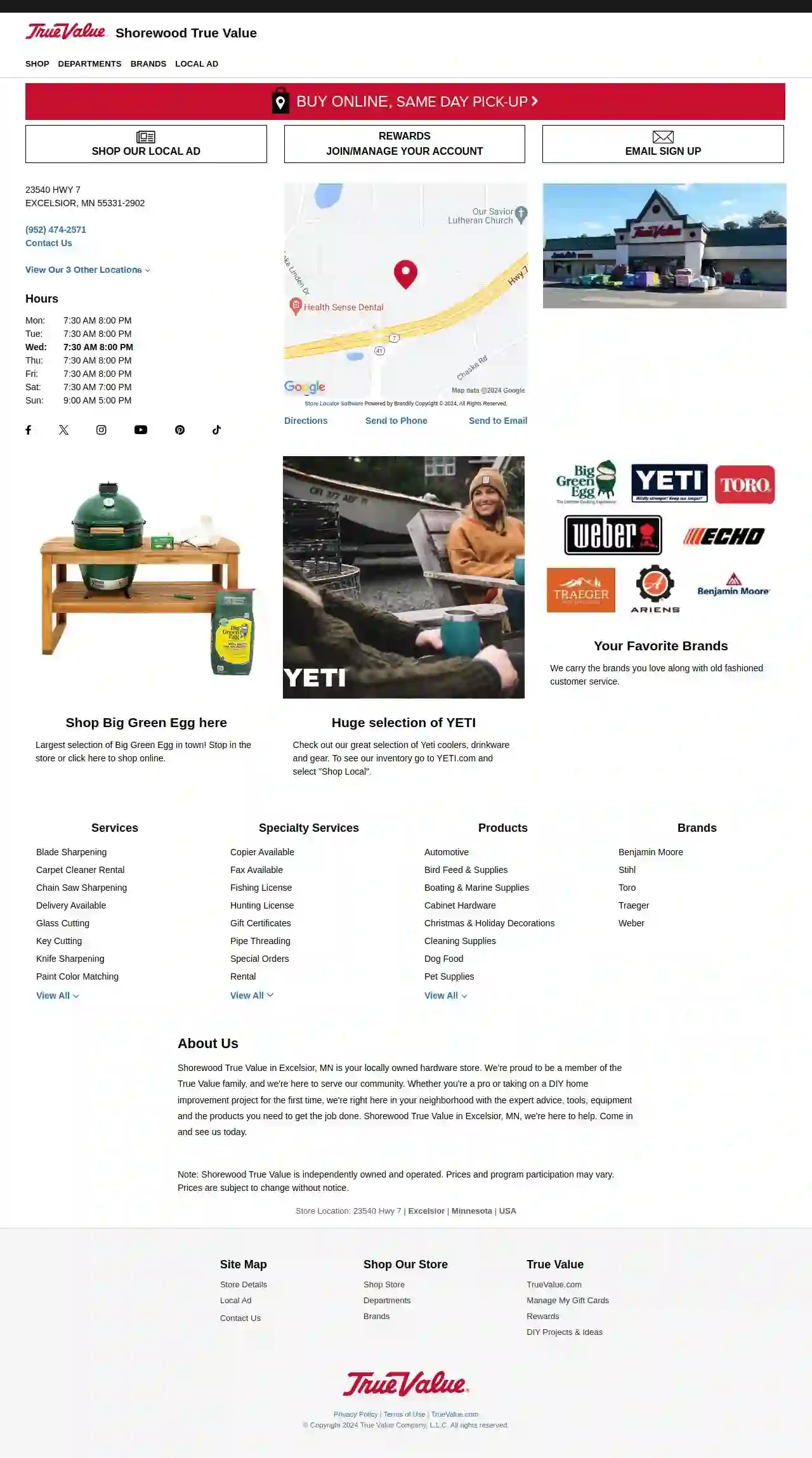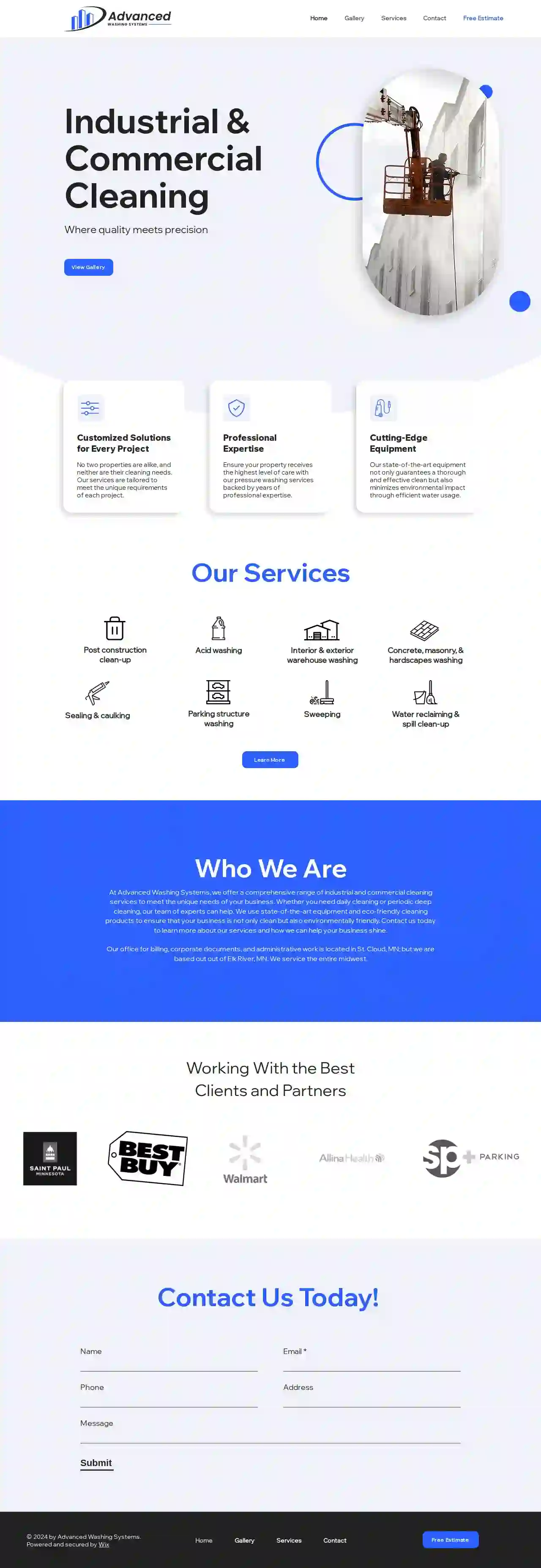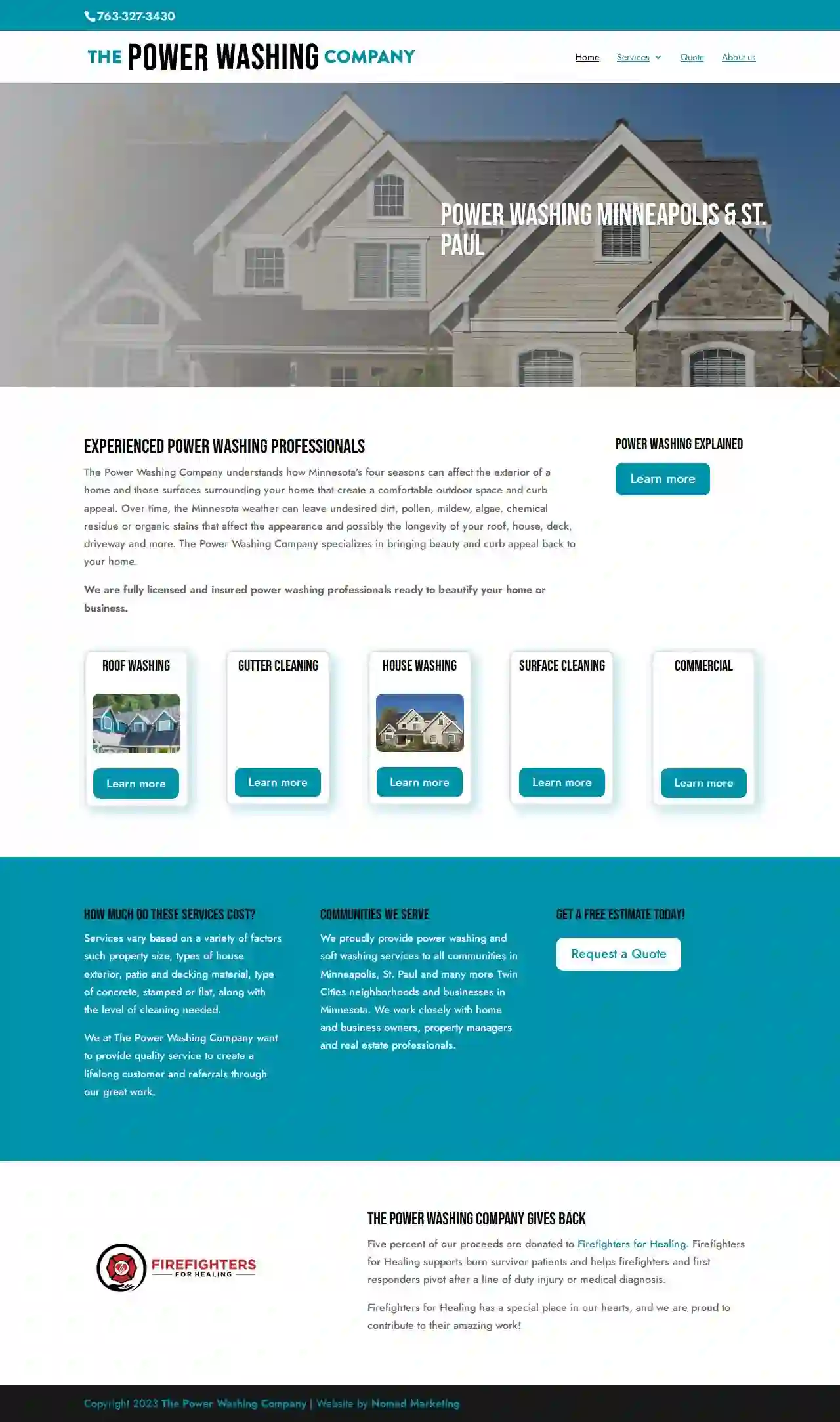Pressure Washing Pipestone
Best Power Washing in Pipestone
Receive multiple Pressure Washing quotes for your project today! Compare profiles, reviews, accreditations, portfolio, etc... and choose the best offer.

Mike's Power Wash
Not provided., Chanhassen, 55317, USMike's Power Wash is a local, family-owned and operated business dedicated to preserving and beautifying homes in the Western Minneapolis area since 1998. They specialize in various services including Cedar/Asphalt Roof Cleaning, Anti-Algae Treatment, House Washing, Deck Cleaning & Sealing, Spring/Fall Gutter Cleaning, Fence Cleaning & Sealing, Cement Cleaning, Roof Snow and Steam Process Ice Dam Removal, and General Pressure Washing. With over 20 years of experience, they offer reasonable rates and have earned multiple awards such as Angie's List Super Service Award Winner, Next Door Neighborhood Favorite, BBB A+ rating, and an Ethics Award Nominee.
- Services
- Why Us?
- Accreditations
- Our Team
- Testimonials
- Gallery
Get Quote
RTD Power Washing
4.315 reviews365 Webster Street, St. Paul, 55102, USRTD Power Washing is a Twin Cities based company specializing in Fleet Washing, Heavy Duty Equipment Cleaning, and Commercial Property power washing. We've been serving Minnesota since 1995 and are committed to providing high-quality service while protecting the environment. Our professionally trained staff utilizes the latest equipment and techniques to ensure your fleet or building looks its best. We stand behind our work 100% and offer a satisfaction guarantee. RTD Power Washing is certified by the Power Washers of North America (PWNA) and was the first in Minnesota to earn Water Reclaimer certification. This means we are held to the highest industry standards. We strive to build long-term relationships with our customers based on trust and exceptional service.
- Services
- Why Us?
- Accreditations
- Testimonials
- Gallery
Get Quote
Roc Services
11 reviewsWest Henrietta, NY, 92 Candleford Heights, Rochester, 14586, USRoc Services is a premier Pittsford pressure washer founded in 2015 by owner Maria Monclus. With 22 years of experience in the industry, Maria is committed to providing personalized services to our clients while delivering world-class results with our products and services. Our mission is to exceed our clients' expectations, and we promise to charge them only after they are completely satisfied with our work. We take pride in using the latest pressure washer technology and techniques to ensure the best possible results, all while providing friendly and professional customer service.
- Services
- Why Us?
- Accreditations
- Our Team
- Testimonials
- Gallery
Get Quote
Bloomington Pressure Washing
51 reviewsBloomington, MN, 123 Main St, 55420, USBloomington Pressure Washing is a professional power washing company in Bloomington, MN, offering residential and commercial pressure washing services. Our team is well-trained and members of the PWRA and PWNA, ensuring we meet the needs of our customers. We use environmentally friendly and biodegradable solutions and high-grade equipment for top results. Our services include residential pressure washing, commercial pressure washing, deck and patio cleaning, and more.
- Services
- Why Us?
- Accreditations
- Our Team
- Testimonials
- Gallery
Get Quote
Aqua Blast
59 reviewsTwin Cities, USExterior Cleaning Experts Serving the Twin Cities Metro of Minnesota. Call to Get a Free Quote Now! High-Quality Soft and Pressure Washing Services. Aqua Blast is your local go-to company for exterior cleaning services including power washing and pressure washing services. Our team is fully equipped and insured to perform any type of residential and commercial exterior cleaning projects in the Twin Cities of Minnesota and Western Wisconsin area. Whether you need your home's siding soft washed or a parking lot pressure washed, our soft and pressure washing services will leave your property spotless. We are also experts in gutter cleaning and ice dam removal services throughout the year. We take pride in our work, so when you hire us, you will be in touch with our owner from beginning to end. Trust our team to clean your property right the first time. Why not give us a call at 651-303-4894 for a free estimate today? Get A Free Quote Now!
- Services
- Why Us?
- Testimonials
- Gallery
Get Quote
All Clean Power Wash
Shortsville, NY, 4330 Route 96, 14548, USAll Clean Power Wash LLC is a premier provider of power washing and soft washing services. We’ve been delivering trusted and reliable power and pressure washing services to Rochester and Upstate New York for over 10 years. All Clean Power Wash is a full-service company providing exterior soft washing for houses, roofs and everything in between, including wood/composite decks, wood/vinyl fences, paver/concrete patios, paver/concrete walkways, gutter cleaning, gutter whitening, holiday lighting and junk removal. Located in Manchester, southeast of Rochester, we offer power and pressure washing for commercial and residential properties across Upstate New York.
- Services
- Why Us?
- Accreditations
- Our Team
- Testimonials
- Gallery
Get Quote
Ecoblast PowerWashing
4.611 reviewsRochester, USTransform Your Property with the Expert Touch of Our Pressure Washing Services Unleash the Beauty in Every Surface Looking for Pricing? Discover More with Ecoblast-Power washing Where we offer a wide range of affordably priced pressure washing services to meet all of your needs. Our company prides itself on being honest, dependable, meticulous, and knowledgeable in our trade. We believe that our competitive edge lies in the quality of service we provide. Our Guarantee We aim to make your experience with us superior to any other company. Our focus on keeping our loyal clients happy is crucial to our business. Recommendations from satisfied customers fuel our growth. Our team is fully insured, and we back our work with a solid 100% money-back guarantee, highlighting our dedication to your satisfaction and commitment to a superior experience. Why Choose Us Why settle for a lackluster exterior when you can effortlessly revive your home's beauty through power washing? At Ecoblast Power Washing, we take immense pride in offering a broad range of budget-friendly, high-quality pressure washing services tailored to meet all your needs. Whether it's vinyl siding, concrete, wood, or any other exterior surface, rest assured we possess the expertise and equipment to deliver exceptional results. Got Dirt? Don't let dirt, algae, and other natural elements accumulate and mar your home's appearance over time. Let Ecoblast be your partner in preserving and rejuvenating your property, all without breaking the bank. Serving the Greater Rochester and surrounding areas, we're ready to transform your home's exterior. Schedule with us today! Eco-Friendly Approach We're committed to environmental responsibility. Our eco-friendly cleaning solutions are safe for your property and the planet. Advanced Softwash Applications Our softwash techniques are gentle on surfaces but tough on grime. We prioritize the long-term health of your property. Cutting-Edge Equipment We invest in state-of-the-art equipment, ensuring the best results for your property without causing any damage. Exceptional Customer Service Our team is dedicated to providing outstanding customer support at every step of your journey with us. Satisfaction Guarantee We stand by our work with a satisfaction guarantee, giving you peace of mind and confidence in our services.
- Services
- Why Us?
- Testimonials
- Gallery
Get Quote
Shorewood True Value
4.678 reviews23540 Hwy 7, Excelsior, MN, 55331-2902, USShorewood True Value in Excelsior, MN is your locally owned hardware store. We're proud to be a member of the True Value family, and we're here to serve our community. Whether you're a pro or taking on a DIY home improvement project for the first time, we're right here in your neighborhood with the expert advice, tools, equipment and the products you need to get the job done. Shorewood True Value in Excelsior, MN, we're here to help. Come in and see us today.
- Services
- Why Us?
- Accreditations
- Our Team
- Testimonials
- Gallery
Get Quote
Advanced Washing Systems
St. Cloud, MN, USA, 123 Main St, 56301, USAt Advanced Washing Systems, we offer a comprehensive range of industrial and commercial cleaning services to meet the unique needs of your business. Whether you need daily cleaning or periodic deep cleaning, our team of experts can help. We use state-of-the-art equipment and eco-friendly cleaning products to ensure that your business is not only clean but also environmentally friendly. Contact us today to learn more about our services and how we can help your business shine.
- Services
- Why Us?
- Accreditations
- Our Team
- Testimonials
- Gallery
Get Quote
The Power Washing Company
544 reviews123 Main St, Suite 100, Minneapolis, 55421, USThe Power Washing Company is a fully licensed and insured power washing professional dedicated to bringing beauty and curb appeal back to homes and businesses in Minneapolis, St. Paul, and surrounding areas. They specialize in power washing, soft washing, roof washing, gutter cleaning, house washing, patio and deck cleaning, and surface cleaning. Their services are tailored to meet the needs of each property, considering factors such as size, exterior type, and level of cleaning required. The company is committed to providing quality service and supports Firefighters for Healing by donating 5% of their proceeds.
- Services
- Why Us?
- Accreditations
- Our Team
- Testimonials
- Gallery
Get Quote
Over 60,241+ Cleaning Services registered
Our janitorial services operate in Pipestone & beyond!
CleaningMatch has curated and vetted Top Janitorial Companies in and around Pipestone. Find a reliable business today.
Frequently Asked Questions About Pressure Washing
- Reputation and Reviews: Check online reviews and ask for referrals to gauge the company's reputation and customer satisfaction.
- Experience and Expertise: Look for a company with a proven track record and experience in pressure washing various surfaces.
- Licensing and Insurance: Ensure the company is licensed and insured to protect you from liability.
- Equipment and Techniques: Inquire about the company's equipment and techniques to ensure they use appropriate pressure levels and cleaning solutions.
- Quotes and Pricing: Obtain detailed quotes that outline all services and costs.
- Professionalism and Communication: Choose a company that is responsive, communicative, and professional.
- Experience: 'How long have you been in business, and what types of pressure washing projects do you specialize in?'
- Licensing and Insurance: 'Are you licensed, insured, and bonded? Can I see proof of coverage?'
- Equipment and Techniques: 'What type of pressure washer do you use? What cleaning solutions do you use, and are they safe for my surfaces?'
- Safety Precautions: 'What safety precautions do you take during pressure washing?'
- Surface Preparation: 'Will you need to move any furniture or objects before pressure washing?'
- Water Usage: 'Do you use a water reclamation system or other methods to conserve water?'
- Cleanup: 'How do you handle cleanup after pressure washing?'
- Guarantees: 'Do you offer a satisfaction guarantee?'
- References: 'Can you provide references from previous clients?'
- Pressure Washing: If your siding is in good condition but dirty or stained, pressure washing can effectively restore its appearance without the need for painting.
- Painting: If your siding is faded, chipped, peeling, or damaged, pressure washing alone may not be sufficient. Painting provides a fresh coat of protection and a new look.
- Pressure Washing Before Painting: Pressure washing is an essential step before painting, as it removes dirt, grime, and loose paint, creating a clean surface for the new paint to adhere to.
What should I look for in a pressure washing company?
A reputable pressure washing company will prioritize safety, use appropriate cleaning methods, and provide excellent customer service.
What is the difference between pressure washing and soft washing?
Pressure washing uses high-pressure water spray to blast away dirt, grime, and other stubborn contaminants from hard surfaces. It's effective for cleaning driveways, decks, patios, fences, and siding.
Soft washing utilizes low-pressure water combined with specialized cleaning solutions to gently remove dirt, mold, mildew, and algae from delicate surfaces like roofs, siding, and painted surfaces. Soft washing is less abrasive than pressure washing, preventing damage to sensitive materials.
Choosing the appropriate cleaning method depends on the type of surface, its condition, and the desired cleaning outcome. Consult with a professional pressure washing company to determine the best approach for your specific needs.
What questions should I ask a pressure washing contractor before hiring them?
By asking these questions, you can gather valuable information and choose a pressure washing contractor that meets your requirements.
Is it better to pressure wash or paint my house?
Assess the condition of your siding and your desired outcome to determine whether pressure washing, painting, or a combination of both is the best approach.
What should I look for in a pressure washing company?
- Reputation and Reviews: Check online reviews and ask for referrals to gauge the company's reputation and customer satisfaction.
- Experience and Expertise: Look for a company with a proven track record and experience in pressure washing various surfaces.
- Licensing and Insurance: Ensure the company is licensed and insured to protect you from liability.
- Equipment and Techniques: Inquire about the company's equipment and techniques to ensure they use appropriate pressure levels and cleaning solutions.
- Quotes and Pricing: Obtain detailed quotes that outline all services and costs.
- Professionalism and Communication: Choose a company that is responsive, communicative, and professional.
A reputable pressure washing company will prioritize safety, use appropriate cleaning methods, and provide excellent customer service.
What is the difference between pressure washing and soft washing?
Pressure washing uses high-pressure water spray to blast away dirt, grime, and other stubborn contaminants from hard surfaces. It's effective for cleaning driveways, decks, patios, fences, and siding.
Soft washing utilizes low-pressure water combined with specialized cleaning solutions to gently remove dirt, mold, mildew, and algae from delicate surfaces like roofs, siding, and painted surfaces. Soft washing is less abrasive than pressure washing, preventing damage to sensitive materials.
Choosing the appropriate cleaning method depends on the type of surface, its condition, and the desired cleaning outcome. Consult with a professional pressure washing company to determine the best approach for your specific needs.
What questions should I ask a pressure washing contractor before hiring them?
- Experience: 'How long have you been in business, and what types of pressure washing projects do you specialize in?'
- Licensing and Insurance: 'Are you licensed, insured, and bonded? Can I see proof of coverage?'
- Equipment and Techniques: 'What type of pressure washer do you use? What cleaning solutions do you use, and are they safe for my surfaces?'
- Safety Precautions: 'What safety precautions do you take during pressure washing?'
- Surface Preparation: 'Will you need to move any furniture or objects before pressure washing?'
- Water Usage: 'Do you use a water reclamation system or other methods to conserve water?'
- Cleanup: 'How do you handle cleanup after pressure washing?'
- Guarantees: 'Do you offer a satisfaction guarantee?'
- References: 'Can you provide references from previous clients?'
By asking these questions, you can gather valuable information and choose a pressure washing contractor that meets your requirements.
Is it better to pressure wash or paint my house?
- Pressure Washing: If your siding is in good condition but dirty or stained, pressure washing can effectively restore its appearance without the need for painting.
- Painting: If your siding is faded, chipped, peeling, or damaged, pressure washing alone may not be sufficient. Painting provides a fresh coat of protection and a new look.
- Pressure Washing Before Painting: Pressure washing is an essential step before painting, as it removes dirt, grime, and loose paint, creating a clean surface for the new paint to adhere to.
Assess the condition of your siding and your desired outcome to determine whether pressure washing, painting, or a combination of both is the best approach.